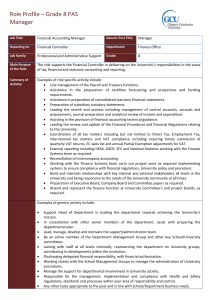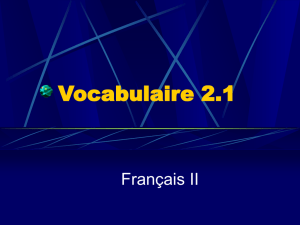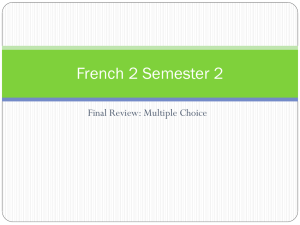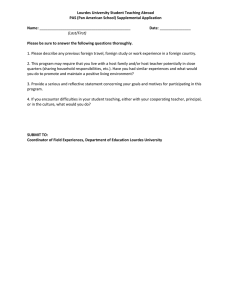Head movement Recapitulation
advertisement
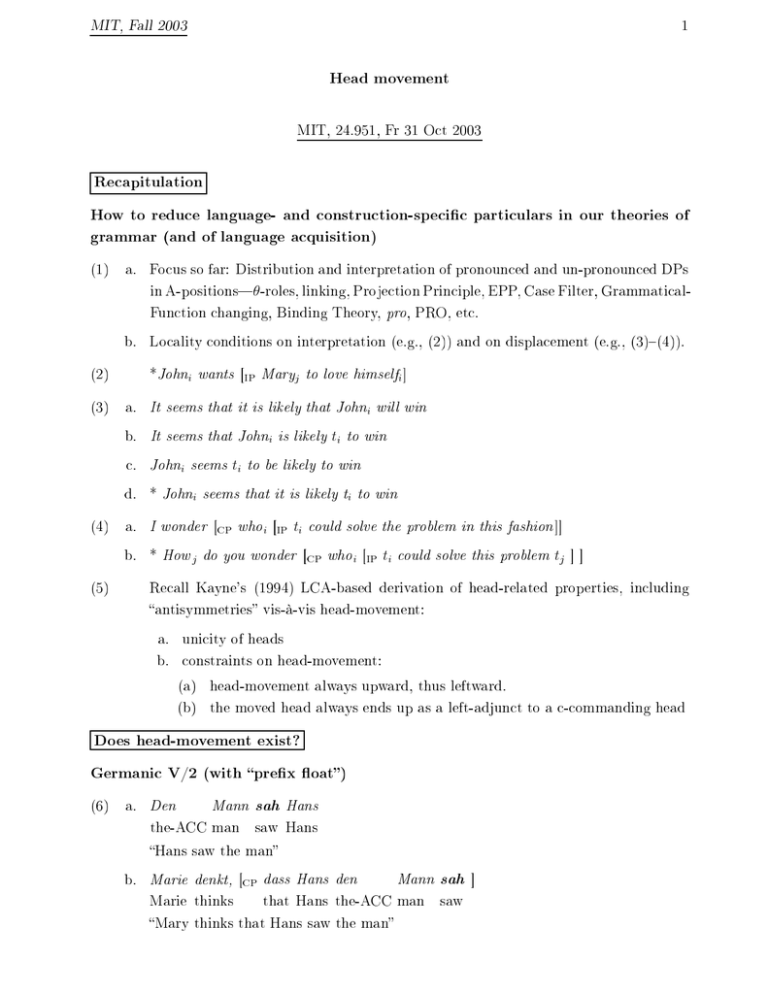
MIT, Fall 2003
1
Head movement
MIT, 24.951, Fr 31 Oct 2003
Recapitulation
How to reduce language- and construction-specic particulars in our theories of
grammar (and of language acquisition)
(1) a. Focus so far: Distribution and interpretation of pronounced and un-pronounced DPs
in A-positions-roles, linking, Projection Principle, EPP, Case Filter, GrammaticalFunction changing, Binding Theory, pro, PRO, etc.
b. Locality conditions on interpretation (e.g., (2)) and on displacement (e.g., (3)(4)).
(2)
*John wants [IP Mary to love himself ]
(3) a.
b.
c.
d.
It seems that it is likely that John will win
It seems that John is likely t to win
John seems t to be likely to win
* John seems that it is likely t to win
i
j
i
i
i
i
i
i
i
i
(4) a. I wonder [CP who [IP t could solve the problem in this fashion ]]
b. * How do you wonder [CP who [IP t could solve this problem t ] ]
i
i
j
(5)
i
i
j
Recall Kayne's (1994) LCA-based derivation of head-related properties, including
antisymmetries vis-à-vis head-movement:
a. unicity of heads
b. constraints on head-movement:
(a) head-movement always upward, thus leftward.
(b) the moved head always ends up as a left-adjunct to a c-commanding head
Does head-movement exist?
Germanic V/2 (with prex oat)
(6) a. Den
Mann sah Hans
the-ACC man saw Hans
Hans saw the man
Mann sah ]
b. Marie denkt, [CP dass Hans den
Marie thinks that Hans the-ACC man saw
Mary thinks that Hans saw the man
2
24.951
(7) a. Den
Mann haben wir gehesen
the-ACC man have we seen
We have seen the man
b. Marie denkt, [CP dass wir den
Mann gehesen haben ]
Marie thinks that we the-ACC man seen have
Mary thinks that we have seen the man
(8) a. Hans sagte, [CP dass Arnold glücklich sei ]
Hans said
that Arnold happy is
b. Hans sagte, [CP glücklich sei Arnold ]
Hans said
happy is Arnold
(9) a. Wir müssen jetzt das Licht anmachen
we must now the light on-make
We must now turn the light
b. Wir machen jetzt das Licht an
we make now the light on
We are now turning the light
Den Besten's (1981) account:
(10) a. Underlying structure: [IP Subject [VP Object (Prex-)V] I ]
b. When C is lled: do nothing.
c. When C is empty:
i. move the tensed verb to C (because C carries some V-featuretense?)
ii. move some XP to Spec(CP) (because of EPP?)
Verb-placement in French vs. English (Emonds 1978, Pollock 1989, etc.)
Placement of nite main verbs
(11) a.
b.
c.
d.
Do you like spinach?
We don't like spinach
We often eat chocolate
They all love Mary
[CP Do [IP Subj V Obj ]]]
[IP Subj do not V Obj]
[IP Subj Adv V Obj]
[IP Subj all V Obj]
(12) a.
b.
c.
d.
Aimez-vous les epinards
Nous (n')aimons pas les epinards
Nous mangeons souvent du chocolat
Ils aiment tous Marie
[CP V [IP Subj Obj ]]]
[IP Subj (ne ) V pas Obj]
[IP Subj V Adv Obj]
[IP Subj V tous Obj]
MIT, Fall 2003
(13) a.
b.
c.
d.
3
*Like-you spinach?
*We like not spinach
*We eat often chocolate
*They love all Mary
(14) a. * Nous (ne) pas aimons les epinards
b. * Nous souvent mangeons du chocolat
c. * Ils tous aiment Marie
Placement of French innitives vis-à-vis negation
(15) a. Manger les epinards, c'est bon pour la santé
b. Ne pas manger les epinards, c'est mauvais pour la santé
c. *Ne manger pas les epinards, c'est mauvais pour la santé
Placement of modals and auxiliaries vs. placement of (main) verbs (Pollock's (1989) discovery)
(16) a. We have not eaten spinach
b. Have you eaten spinach?
[IP Subj Vaux not Vmain Obj]]
[CP Vaux [IP Subj Vmain Obj]]
(17) a. He could not speak French
b. Could he speak French?
(18) a. Ne pas être heureux est une condition pour écrire des romans.
Not to be happy is a requirement for writing novels
b. N' être pas heureux est une condition pour écrire des romans.
(19) a. Ne pas avoir de voiture en banlieue rend la vie dicile.
Not to have a car
in suburbia makes life dicult
b. N' avoir pas de voiture en banlieue rend la vie dicile.
Ne pas sembler heureux est une condition pour écrire des romans.
Not to seem happy is a requirement for writing novels
b. * Ne sembler pas heureux est une condition pour écrire des romans.
(20) a.
Ne pas posséder de voiture en banlieue rend la vie dicile.
Not to own a car
in suburbia makes life dicult
b. * Ne posséder pas de voiture en banlieue rend la vie dicile.
(21) a.
4
24.951
Head-movement and locality
(22)
Assume that head-movement does exist. It too is local.
(23) a. They could have left
b. Could they t have left?
c. * Have they could t left?
i
i
i
i
(24) a. *Like you spinach?
b. Do you like spinach?
(25) a. *We like not spinach
b. We don't like spinach
(26) a. Whatever can move to INFL can also move to COMP.
b. Whatever moves to COMP must have moved to INFLmovement of the verb to
COMP requires that the verb rst moves to INFL.
c. Head movement can proceed only through the next higher headhead movement
can't skip heads.
(27)
Relativized Minimality (Rizzi 1990f):
with X only if there is no Z such that:
a.
Z
b.
Z
Y
is in a Minimal Configuration
is of the same structural (and featural?) type as X
c-commands Y and does not c-command X (i.e., Z intervenes between X
and Y
Structural types ranges over positions (and their features?)here, A-Spec, ASpec, head.
Recap
(28) a. Implications for:
question formation (V-to-C or not)
placement of negation (V-Neg vs. Neg-V)
placement of certain adverbs (V-Adv vs. Adv-V)
quantier placement (V-Quant vs. Quant-V)
distribution of main verbs vs. auxiliaries (any contrast?)
distribution of nite vs. non-nite verbs
etc.
MIT, Fall 2003
5
b. A verb-movement (V-to-I) parameter?
c. A V-to-I parameter with a morphological trigger?
(Inectional morphology as locus for cross-linguistic variation? Learnability considerations?)
One left-over issue: How many landing sites for V in IP? (Another disvoery by
Pollock 1989)
(29)
Do French nite verbs and nite auxiliaries move in one fell swoop from V to INFL?
In French, nite verbs and nite auxiliaries must precede negation and clause-internal adverbs
(this is not optional, pace Roberts 2000:122)
(30) a. * Il (ne ) pas parle français
He doesn't speak French
b. * Il souvent parle français
He often speaks French
(31) a. * Il (ne ) pas a parlé français
He has not spoken
French
b. * Il souvent a parlé français
He often has spoken French
(32) a. Il (ne ) parle pas français
b. Il parle souvent français
c. Il (n' )a pas parlé français
d. Il a souvent parlé français
(33) a. In French, non-nite main verbs cannot precede pas (see (20)(21)).
b. Are these verbs pronounced in VP/v P? Consider (34).
Ne pas lire les journaux, c'est déplorable
Not to read the newspapers, that's deplorable
b. * Ne lire pas les journaux, c'est déplorable
(34) a.
(35) a.
b.
(36) a.
Souvent lire les journaux, c'est bien
To often read the newspapers, that's good
Lire souvent les journaux, c'est bien
Ne pas souvent lire les journaux, . . .
To not often read the newspapers, . . .
6
24.951
b.
Ne pas lire souvent les journaux,
c. * Ne lire pas souvent les journaux,
(37) a. The explosion of INFL:
[CP . . . [IP . . . INFL VP ] ] 7! [CP . . . [INFL1 P . . . INFL1 [INFL2 P . . . INFL2 VP ] ] ]
b. What are the features of INFL1 and INFL2?
[Cf. Pollock 1989 vs. Belletti 1990 vs. Chomsky 1991, etc.]
(38)
(39) a.
Morphology in Verb PlacementMirror Principle (à la Baker) and verbal axation
as a trigger (cf. (28b)(28c))?
Move to INFL if inectional morphemes need to be stacked as axes on V (cf. Lasnik's Stray Ax Filter ).
[For discussion and alternatives, see Pollock 1989, Chomsky 1993, Roberts 1995,
Rohrbacher 1994, Vikner 1995, Bobaljik 2001, etc.]
b.
AgrP
HHH 0
Agr
0HHH
TP
Agr
-a
HHH
`3sg'
T0
0 HHH
T
VP
-er HHH
`FUT'
V0
0 HH
V Obj
aim
`love'
Before Fr V-raising
AgrP
HHHH
H
Agr0
HHH
H
0
Agr
TP
[[aim -er] -a ] HH
T0
0 HH
T
VP
t
HH 0
V
0HH
i
j
j
V
ti
Obj
After Fr V-raising
(40) a. How does the English nite verb collects its inectional suxes (e.g., -s and -ed )?
INFL-lowering (at PF?)?
b. Recall Chomsky's (1957) Ax Hopping:
Verb
7! Aux + V
Aux
7! C (M) (have + en) (be + ing) (be + en)
C
7! one of { +s, +;, +ed }
A + v 7! v+A#
[See Lasnik's (2000) Syntactic structures revisited ]
MIT, Fall 2003
7
A digression:
(41) a. The Cinquean explosion of INFL:
[CP . . . [INFL1 P . . . INFL1 [INFL2 P . . . INFL2 . . . INFL1 345 VP ] ] ]
b. Cf. the Rizziesque explosion of COMP:
[COMP1P . . . COMP1 [COMP2P . . . COMP2 [COMP3P . . . COMP3 [COMP4P . . . COMP4 . . .
In English and Italian:
[ForceP RelOp [Force che /that [ TopicP [FocusP Focus-/wh-phrases [ TopicP [FinP [Fin di /for [IP . . .
c. Also see Larson's VP-shells, Ritter's articulated DP, etc.
;
0
0
Back to localitylong head-movement
An excursus into wh-movement for evidence on relativized intervention
Q-split in French:
(42) a. [Combien de livres ] a-t-il consultés t ?
[How-many of books] has-he consulted t ?
b. Combien a-t-il consulté [t de livres ] ?
How-many has-he consulted [t of books] ?
i
i
i
i
i
i
i
i
(43) a. Il a consulté [beaucoup de livres ]
He has consulted [many of books]
b. Il a beaucoup consulté [t de livres ]
He has many
consulted [t of books]
Q-split obeys islands as adjuncts do:
i
i
i
i
(44) a. [Combien de problèmes ] sais-tu
[ comment [ PRO résoudre t t ] ]
[How-many of problems] do you know [ how
[ PRO to solve t t ]]
b. *Combien sais-tu
[ comment [ PRO résoudre [ t de problèmes ] t ] ]
How-many do you know [ how
[ PRO to solve [ t of problems ] t ]]
Pseudo-opacity in French:
i
j
i
j
i
j
i
(45)
j
Il a beaucoup
consulté ces livres
He has a-lot / many-times consulted these books
(46) a. [Combien de livres ] a-t-il beaucoup consultés t ?
[How-many of books] has-he a-lot
consulted t ?
b. * Combien a-t-il beaucoup consulté [ t de livres ] ?
How-many has-he a-lot
consulted [ t of books] ?
i
i
i
i
i
i
i
i
i
j
i
j
i
j
i
j
8
(47)
24.951
Beaucoup in Spec(VP) is an intervening other Z : beaucoup is in A-bar position
that interferes with adjunct extraction, on a par with who in intermediate Spec(CP)
in (4b) (Rizzi 1990).
Relativized intervention in long head-movement? Breton V-to-C movement à la Roberts
(48) a. Lennet en
deus Yann al lever
Read 3sg-masc has Yann the book
`Yann has read the book'
b. *Lennet n' en
deus ket Yann al lever
Read NEG 3sg-masc has NEG Yann the book
`Yann has not read the book'
*O lenn emañ Yann al lever
Prog read is Yann the book
`Yann is reading the book'
(49)
Roberts's (2000:144) typology of heads vis-à-vis Relativized Minimality:
a. Lexical vs. functional heads (the progressive auxiliary is lexical)
b. Among functional heads, operator vs. non-operator heads (C and Neg are operator heads while T is a non-operator head).
Head-movement in the DP?
Distribution and interpretation of adjectives across Romance (Bernstein 1992)
(50) a.
b.
c.
d.
e.
`The simple/mere man . . . '
El simple hombre . . .
El hombre simple . . .
`The simple(-minded) man . . . '
El hombre es simple
`The man is { simple-minded j *mere }
* El accidente es mero
`The accident is mere'
El mero accidente . . . vs. * El accidente mero . . .
(Spanish)
(51) a.
b.
c.
d.
e.
Il pover'uomo . . .
`The pitiable man . . . '
L'uomo povero . . . `The impoverished man . . . '
L'uomo è povero . . . `The man is { impoverished j *pitiable }
* L'accidente è mero
`The accident is mere'
Un mero accidente . . . vs. * Un accidente mero . . .
(Italian)
(52) a.
b.
c.
Une certaine chose . . . `A certain (i.e., particular) thing . . . '
Une chose certaine . . . `A certain (i.e., sure) thing . . . '
La chose est certaine
`The thing is { sure j *particular }
(French)
MIT, Fall 2003
d.
e.
9
* La maison est autre
`The house is other'
L'autre maison . . . vs. * La maison autre . . .
Where does N raise to?
(53)
Un gros camion rouge
A big truck
red
(54) a. [DP Il mio Gianni ]
The my Gianni
`My Gianni'
b. * [DP mio Gianni ]
(French)
(Italian)
c. [DP Gianni mio ]
(55)
hu
ir-rag
gel il-kbir
brother the-man the-big
`the man's big brother' / `the big man's brother'
(56)
ha-godol
beyt ha-i
house the-man the-big
`the man's big house / `the big man's house'
R
(Maltese)
(Hebrew)



